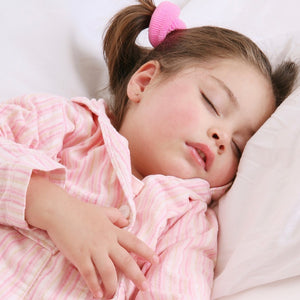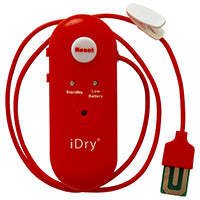Does Deep Sleep Cause Bedwetting?
October 31, 2018

Both children and adults go through different sleep stages during the night. These can be summarised as periods of light sleep, very deep sleep and REM (rapid eye movement) sleep, also known as dream sleep.
Very deep sleep occurs for about half of the total sleep time in babies and gradually reduces to about a quarter of the total sleep time in adults. Longer periods of very deep sleep tend to occur early in the night with shorter periods later in the night. The exact amount of each type of sleep varies from child to child just as it does in adults and will not be the same every night even for the same child. Depending on which part of the body needs restoring the most each night e.g muscles versus brain, can lead to varying amounts of each type of sleep.
During very deep sleep everything relaxes and breathing slows. People become less responsive to what is going on around them including any noise. It is very difficult to rouse someone who is in this stage of sleep. If a child wets the bed during this deep sleep stage then it can be almost impossible to wake the child. Parents sometimes report the enuresis bedwetting alarm sounding because their child has wet the bed but the child seems oblivious to the loud noise, happily sleeping straight through the sound of the alarm.
Research is continuing into this area.
Children who wet the bed do seem to be more difficult to rouse at night, are more likely to have difficulty getting to sleep, more likely to sweat, snore and have breathing difficulties and tiredness in the morning. The good news is that even these children can be helped and achieve a permanent cure for bedwetting.
What can help?
Parents often report that their child wets in the first couple of hours after going to bed. Just having the child wet later in the night when the child may be less likely to be in the very deep stage of sleep may mean that the child is more responsive to a bed wetting alarm.
Various strategies can help delay the bedwetting until later in the night and it is usually best to introduce these strategies first rather than have an unsuccessful attempt with a bedwetting alarm. The aim is for the child’s bladder to comfortably hold more urine at night and to stop the kidneys working overtime at night producing excess urine. Constipation needs to be eliminated as an exacerbating factor causing pressure on the bladder. Each measure helps a little. The bedwetting episode should start happening later in the night when the child is not sleeping so deeply. The child is then more likely to wake up to an enuresis alarm and eventually get up rather than wetting the bed or sleep through until morning.
The Bedwetting Institute® program on DVD helps with these strategies. A bedwetting alarm is then more likely to wake the child even in children who are very deep sleepers. We also recommend getting the loudest possible alarm for children who sleep very deeply.
See our range of alarms
Our loudest alarms





